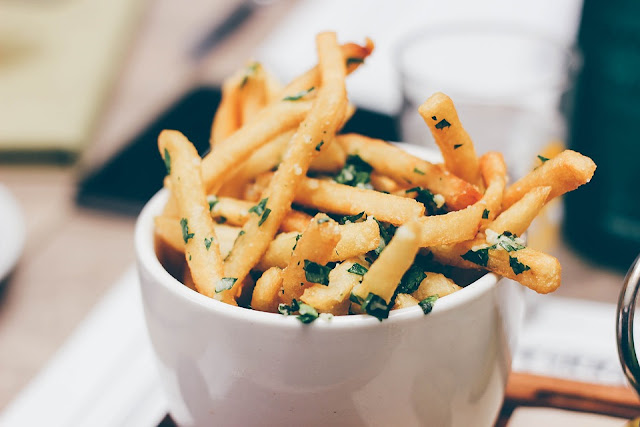Tiny Seeds, Big Benefits: Why Poppy Seeds Deserve a Spot in Your Indian Kitchen
Tiny but mighty, poppy seeds—known as khus khus in Indian kitchens—are often underestimated. These little seeds, derived from the opium poppy plant (Papaver somniferum), have been a part of traditional Indian cooking for centuries, not just for their subtle nutty flavor, but also for their impressive health benefits. Whether sprinkled over dishes or ground into creamy gravies, poppy seeds bring a delightful texture, richness, and wellness punch to everyday meals.
 |
| Picture Courtesy- Pexels |
Health Benefits of Poppy Seeds
1. Rich Source of Nutrients
Poppy seeds may be tiny, but
they’re nutrient powerhouses—rich in calcium, iron, magnesium, zinc, and fiber.
They also contain healthy fats, including omega-3 and omega-6 fatty acids,
which are important for heart and brain health.
Must Read # A Healthy Twist on Classic Cakes with Guilt Free Dessert Options
2. Promotes Better Digestion
Thanks to their high fiber
content, poppy seeds help regulate bowel movements and promote a healthy
digestive system. They're often included in dishes that are easy on the
stomach, especially during recovery from illness or after heavy meals.
3. Supports Bone Health
Calcium, phosphorus, and
magnesium are crucial for maintaining strong bones, and poppy seeds contain all
three. Regular inclusion in your diet can support skeletal strength and help
prevent conditions like osteoporosis.
4. Helps with Sleep and
Relaxation
Poppy seeds have a mild sedative
effect, especially when soaked in warm milk. They contain compounds that can
help relax the body and promote restful sleep, making them a popular natural
remedy for insomnia in Ayurvedic practices.
5. Boosts Immunity
Zinc and other antioxidants in
poppy seeds help strengthen the immune system, protect against inflammation,
and speed up healing. A dash of poppy in your food can be a quiet warrior
against infections.
6. Skin and Hair Care
In many Indian households, poppy seeds are ground into a paste and used in homemade masks to soothe dry skin, treat dandruff, and nourish the scalp. When consumed, their antioxidant content helps maintain youthful, glowing skin.
Also Read- Elevate Your Indian Cuisine with Healthy Seeds.
How to Use Poppy Seeds in Indian
Kitchens
1. In Rich Gravies and Curries
In Bengali, Hyderabadi, and
Mughlai cuisines, white poppy seeds are often soaked, ground, and blended into
gravies. The paste adds thickness, creaminess, and a delicate flavor to dishes
like Aloo Posto, Chicken Korma, or Paneer Rezala.
2. As a Garnish in Baked Goods
Though not traditionally Indian,
fusion recipes like poppy seed muffins or cookies are gaining popularity. The
seeds add a pleasant crunch and nutty taste, and pair well with jaggery or
cardamom.
3. In Desserts
In some Indian sweets like khus
khus halwa or kheer, poppy seeds add richness and texture. They are especially
used during winter, as they are believed to generate warmth in the body.
4. As a Milk Additive
A time-tested bedtime remedy in
Indian households is warm milk with ground poppy seeds, turmeric, and honey. It
helps soothe the nerves and promotes deep sleep.
5. In Spice Mixes and Chutneys
Poppy seeds can be dry roasted
and blended into masalas or chutneys. Their subtle nuttiness enhances the
flavor of dry vegetable dishes and lentils.
A Word of Caution
While poppy seeds used in Indian cooking are safe, they do come from the opium plant. The seeds sold for culinary use are thoroughly cleaned and contain only trace alkaloids, but overconsumption should be avoided, especially in children or pregnant women.
Poppy seeds are more than just a
pantry staple—they’re a nutritional powerhouse hiding in plain sight. Whether
ground into silky gravies or sprinkled over sweets, these tiny seeds carry a
rich legacy of flavour and wellness.





We all wish to thank so many good articles you provide here, thanks for sharing... MM
ReplyDeleteI have read this article; it is very informative and helpful for me. Great job you did... MM
ReplyDeleteThis is an excellent post I seen, thanks that you share it with us very good... MM
ReplyDeleteThank you ever so much for your blog post. Really thank you! Really Cool... MM
ReplyDeleteAppreciate you sharing, great article post. Much thanks again. Fantastic... MM
ReplyDeleteBest amazing blog i like it.
ReplyDeleteAbsolutely love this post! 🌿 It’s amazing how something as tiny as poppy seeds can pack such a big nutritional punch while also enhancing the flavor of everyday dishes. Just like exploring traditional recipes, discovering authentic local cuisine shows us how simple ingredients have been used for centuries to create both delicious and healthy meals. Tiny seeds, big benefits indeed!
ReplyDeleteAbsolutely! It’s amazing how something so small can have such a big impact on both flavor and nutrition. Tiny seeds really do pack a powerful punch!
DeleteWonderful post! 🌿 Poppy seeds truly are a hidden gem in Indian cooking—adding both flavor and nutrition. I especially love how they enrich gravies and desserts while offering health benefits like better digestion, bone strength, and improved sleep. A small ingredient with such big impact!
ReplyDeleteWearing a captain america jacket is a great way to show your love for Marvel’s first Avenger.
ReplyDeleteA Women's clothing boutique Saharanpur typically stocks exquisite dresses, lehangas, and accessories with personalized fitting services to enhance both style and elegance.
ReplyDeleteTiny poppy seeds offer big benefits—boost digestion, add flavor, and enrich Indian dishes with essential nutrients and aroma. For more information check llp Registration in Chennai
ReplyDeleteAir Force Blues Occupational Badge – Meaning, Placement, and Custom Orders
ReplyDeleteWearing the Air Force Blues occupational badge correctly demonstrates professionalism and respect for tradition. This guide explains Air Force Blues occupational badge placement, how to wear them on Blues shirts, and differences between custom and standard badges. Find out how to make an Air Force Blues occupational badge, explore purchasing options, and understand when custom occupational badges Air Force Blues are appropriate. From official guidelines to reliable sources on where to buy Air Force Blues occupational badges, this article ensures you meet uniform standards while proudly displaying your Air Force specialty.
https://rushpatch.com/blogs/news/exploring-the-depths-of-air-force-blues-occupational-badge
Your creative writing abilities inspired me to get my own blog. Thank you
ReplyDeleteI will bookmark this blog and check here again. Keep doing your blog post
ReplyDeleteI would like to bookmark the page I come to read again. Wonderful job
ReplyDeleteAssignments and homework based on Nuclear physics are among the toughest jobs any student will ever have to deal with. If you too pursue this course in your academic curriculum, then you will surely encounter difficulties and dilemmas while completing your academic tasks. There must be a time when you have probably found yourself desperate and someone to help you in your assessment jobs. Don’t worry. Get the best Nuclear Physics Assignment Help and free from the worry of doing academic tasks on time!
ReplyDelete